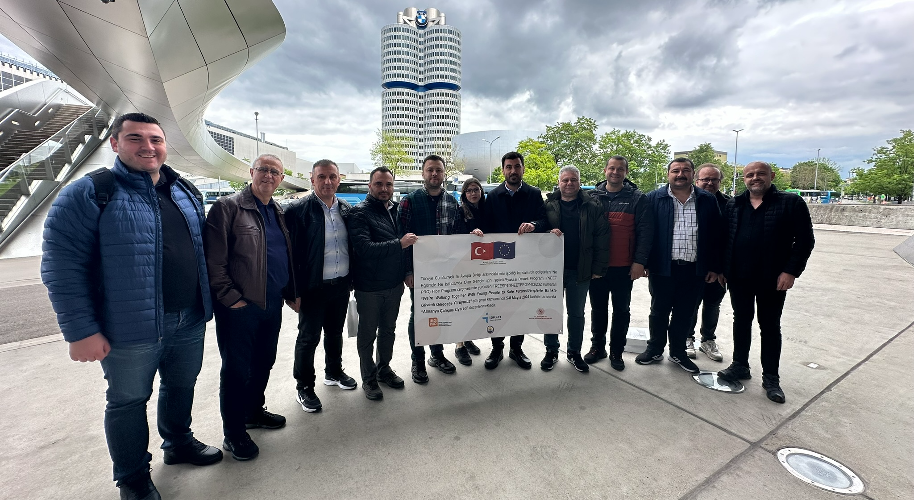Germany Study Visit

Germany Study Visit
A 12-person delegation paid a study visit to the Munich region of Germany on May 5-6-7-8, 2024. The Chamber of Commerce and Industry and the Munich and Upper Bavaria Professional Chambers visited in the region provided detailed information about the region.
Munich CCI - Chamber of Commerce and Industry
Germany is governed by states. A certain federal government sets certain rules for them to follow every year. The aims of the chamber of commerce in Germany are to ensure that trade and paperwork are more organized. For example; a company exports abroad. When the original document for export is required, it goes to the chamber of commerce and approves it. In addition, the facilities in the Organized Industrial Zone are given to those who will establish a business through the chambers of commerce.
Each company has the right to vote individually, regardless of the number of employees. They do not charge membership fees for companies with an annual turnover of up to 5,000 euros, and a fee is charged according to the profit made by companies over 5,000 euros.
The ones they export the most; • Car parts 16%
• Data processing, i.e. software 14%
• Electricity 12%
• Machinery 8%
• Chemical 5%
• Gas 3%
Education in Germany consists of three stages. A student's good grade does not mean that he/she will be good. Teachers spend 2-3 hours, if necessary, on each student and try to distinguish whether the student got the grade by studying or because he/she is smart. After this distinction is made, the smartest ones go to "Gymnasium". 99% of those who go to Gymnasium go on to university. All children go to primary school (Grundschule/Primarschule) from the age of 6 or 7. Middle school starts after the 4th grade. There are many different types of middle schools. There are secondary schools called "Hauptschule" or "Mittelschule" (5th-9th). A secondary school diploma (Hauptschulabschluss) or a vocational secondary school diploma (qualifizierender Hauptschulabschluss) is obtained from these schools. In secondary school, there are also practical courses such as workshops or technical drawing. From higher-level secondary schools called "Realschule" (5th-10th grade), a diploma called "Realschulabschluss" is received. After the "Hauptschule" or "Realschule" type secondary school, vocational training can be started. Vocational training lasts 3 years in Germany.
In fact, it is more attractive for students to get a university education, but the chamber of commerce directs them to get vocational training. There is no exam for university entrance in Germany; you take the high school graduation exam called "Abitur" and thus continue to university.
Vocational training in Germany lasts three years, after which there is no need to take the "Abitur". While continuing to university, you both practice your profession and continue your education. Actually, like TOBB University does in Turkey. Vocational training has also started recently in Turkey. They send students to work on certain days starting from the first year of school. This tells us the importance of learning on the job. In the German system, there is respect for those who have a job. You can be an engineer, a mechanic, a painter. As long as this prestige is achieved, people do not hesitate to do any job.
50% more people prefer vocational training after graduating from school. The chamber of commerce supervises where students will do their 3-year internship, what kind of program they will do, how many hours of lessons they will have, when they will have their leave, when they will have their vacation.
The place where students do their internship is different within the business. They are given a chef and they receive training there, they do not enter the sector directly. After doing their internship there for 6 months, they start working in the field they did their internship in under the supervision of someone.
They share various posts on social media to make vocational training more attractive. They share short videos on Tiktok. They participate in job fairs. They organize information events for families about vocational training. They share posters saying “Vocational training makes families happy and proud.” They try to attract attention with funny videos on Instagram.
Gmund Paper Mill
Gmund Paper Mill is a well-established paper manufacturer located in Gmund am Tegernsee in the Bavarian region of Germany. Founded in 1829 by Johann Nepomuk Haas, this factory was initially established to produce handmade fine papers. Ludwig Alois Kohler, in particular, has undertaken innovative work in the production of colored paper and in giving paper various textural features. Gmund Paper Mill is taking important steps in terms of sustainability. For example, 75% of the factory's energy needs are met by renewable and emission-free sources. In addition, Gmund papers are FSC certified, meaning they are produced in accordance with sustainable forestry practices. Gmund Paper, which has a very wide product range, offers various paper collections and personalized products. Finally, Gmund Paper Mill is also a pioneer in design and innovation. For example, it has developed a special paper collection for the 100th anniversary of the Bauhaus.
